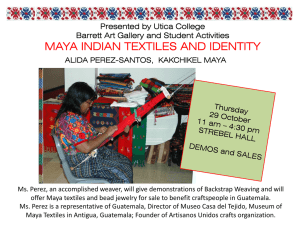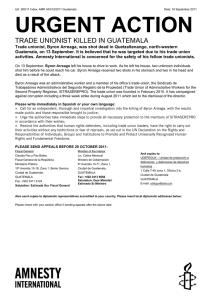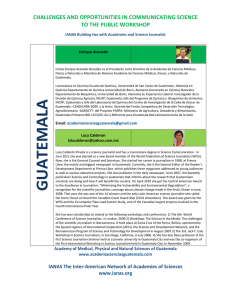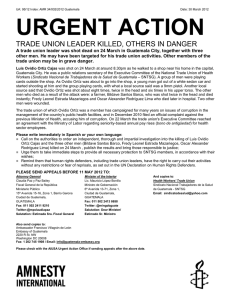UPDATE Vol 18 No 22 - Guatemala Human Rights Commission
Anuncio
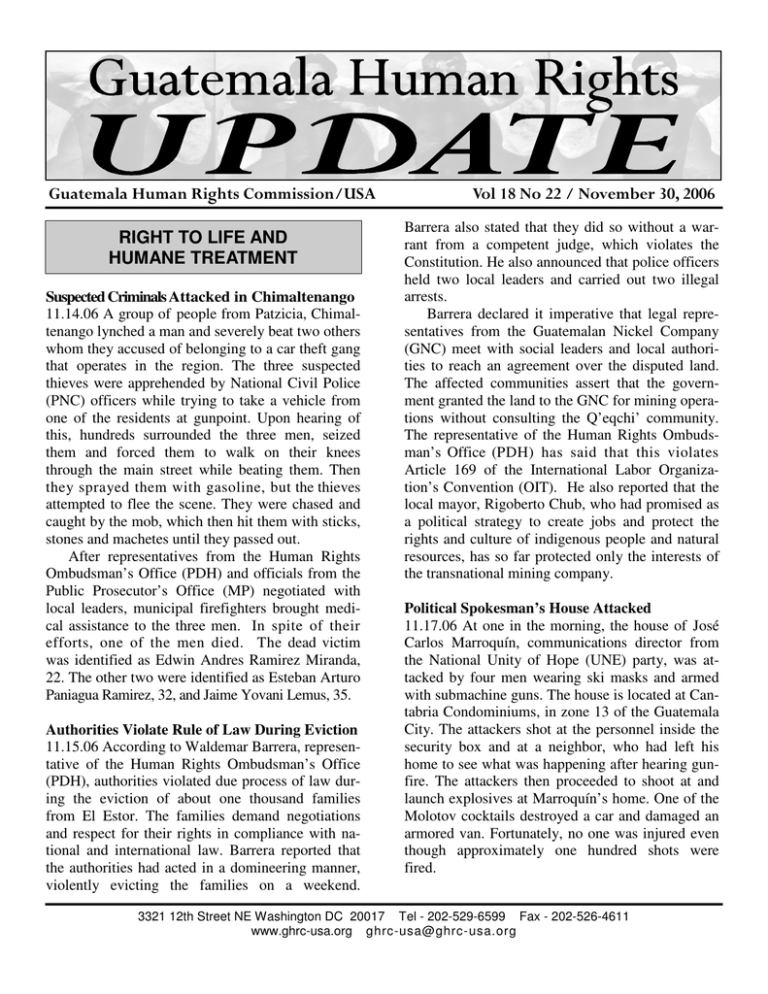
Guatemala Human Rights Commission/USA RIGHT TO LIFE AND HUMANE TREATMENT Suspected Criminals Attacked in Chimaltenango 11.14.06 A group of people from Patzicia, Chimaltenango lynched a man and severely beat two others whom they accused of belonging to a car theft gang that operates in the region. The three suspected thieves were apprehended by National Civil Police (PNC) officers while trying to take a vehicle from one of the residents at gunpoint. Upon hearing of this, hundreds surrounded the three men, seized them and forced them to walk on their knees through the main street while beating them. Then they sprayed them with gasoline, but the thieves attempted to flee the scene. They were chased and caught by the mob, which then hit them with sticks, stones and machetes until they passed out. After representatives from the Human Rights Ombudsman’s Office (PDH) and officials from the Public Prosecutor’s Office (MP) negotiated with local leaders, municipal firefighters brought medical assistance to the three men. In spite of their efforts, one of the men died. The dead victim was identified as Edwin Andres Ramirez Miranda, 22. The other two were identified as Esteban Arturo Paniagua Ramirez, 32, and Jaime Yovani Lemus, 35. Authorities Violate Rule of Law During Eviction 11.15.06 According to Waldemar Barrera, representative of the Human Rights Ombudsman’s Office (PDH), authorities violated due process of law during the eviction of about one thousand families from El Estor. The families demand negotiations and respect for their rights in compliance with national and international law. Barrera reported that the authorities had acted in a domineering manner, violently evicting the families on a weekend. Vol 18 No 22 / November 30, 2006 Barrera also stated that they did so without a warrant from a competent judge, which violates the Constitution. He also announced that police officers held two local leaders and carried out two illegal arrests. Barrera declared it imperative that legal representatives from the Guatemalan Nickel Company (GNC) meet with social leaders and local authorities to reach an agreement over the disputed land. The affected communities assert that the government granted the land to the GNC for mining operations without consulting the Q’eqchi’ community. The representative of the Human Rights Ombudsman’s Office (PDH) has said that this violates Article 169 of the International Labor Organization’s Convention (OIT). He also reported that the local mayor, Rigoberto Chub, who had promised as a political strategy to create jobs and protect the rights and culture of indigenous people and natural resources, has so far protected only the interests of the transnational mining company. Political Spokesman’s House Attacked 11.17.06 At one in the morning, the house of José Carlos Marroquín, communications director from the National Unity of Hope (UNE) party, was attacked by four men wearing ski masks and armed with submachine guns. The house is located at Cantabria Condominiums, in zone 13 of the Guatemala City. The attackers shot at the personnel inside the security box and at a neighbor, who had left his home to see what was happening after hearing gunfire. The attackers then proceeded to shoot at and launch explosives at Marroquín’s home. One of the Molotov cocktails destroyed a car and damaged an armored van. Fortunately, no one was injured even though approximately one hundred shots were fired. 3321 12th Street NE Washington DC 20017 Tel - 202-529-6599 Fax - 202-526-4611 www.ghrc-usa.org ghrc-usa@ghrc-usa.org Marroquín later said that he had been threatened but had not taken the threats seriously. He said that the attack is a response to his political activity, which involves confronting groups with questionable interests. UNE Secretary General, Álvaro Colom, said that the attack marks the beginning of violence related to the upcoming elections. Police Allegedly Beat Vendors 11.20.06 In Coatepeque, Quetzaltengo, hundreds of vendors in the informal economy, who have had their stalls set up on the streets around the local market for several years, reported actions by the police and the military aimed at preventing them from continuing their business on the street. More than 150 National Civil Police (PNC) officers and one hundred military personnel were involved. During the operation, makeshift stalls were disassembled and heavy machinery was used to remove more formal structures. The vendors reported that eight of them were beaten by the police. Mayor Leopoldo Tavares stated that the eviction took place in order to force the vendors to move to a more central location. He remarked that, given the semiautonomous way in which the municipality operates, there was no need for a warrant for the eviction. The chief of police, Flavio Augusto Mazariegos, declared that the eviction took place without any major incident and denied the charges that his officers used excessive force. Politicians Suffer 26 Attacks this Year 11.21.06 At least twenty-six attacks have been perpetrated this year against political activists of different organizations in Guatemala: sixteen against the National Revolutionary Unity of Guatemala (URNG), four against the National Unity of Hope (UNE), three against the Patriot Party (PP), two against the Great National Alliance (GANA), and one against Encounter for Guatemala. In Santa Lucía Cotzumalguapa, ten murders of URNG leaders were reported. Among the victims were the mayor of El Naranjo, Juan José Atz, and the leader of the party, Nicholás Raymundo Gómez. The reports also list representative Mario Pivaral, who was killed outside UNE headquarters in April, and the stabbing of the GANA Mayor of Cabañas, Zacapa, Alfredo Vidal, in March. The shooting of Rodolfo Vielmann, adviser to the Patriot Party, in November 30, 2006 zone 9 of Guatemala City on March 29 was also included. In addition, Luis Miguel Garrido, of the Patriot Party, announced that on November 18, a group of young people connected to the party was attacked by a mob of thirty people. Party officials have denounced the lack of action on the part of the Public Prosecutor’s Office in each of these incidents. Minister of the Interior Carlos Vielmann said that, in all the cases, an investigation is being carried out in collaboration with the parties. Authorities Admit Torture Exists in Police Precincts 11.23.06 During a meeting with representatives from the World Organization Against Torture (OMCT), authorities acknowledged an increase in cases of torture in Guatemala. Participants from the Public Prosecutor’s Office (MP), the judiciary, the National Civil Police (PNC) and the penitentiary system concluded that the PNC uses illegal torture techniques to gain information. Frank la Rue, director of the Presidential Human Rights Commission (COPREDEH), commented that women and minors are adversely affected because they are incarcerated at local police stations instead of being taken before a judge. Myrna Ponce, president of the Congressional Human Rights Commission, suggested extending the courts’ working hours in order to reduce the use of local police stations as holding facilities. Penitentiary System Remains in Grave Conditions 11.15.06 Elias Caranza, director of the UN Latin American Institute for the Prevention of Crime and the Treatment of Offenders (ILANUD), has found the Guatemalan penitentiary system to be in grave condition due to the overpopulation of its jails and the use of the death penalty. Caranza stated that the countries with the strictest policies and harshest penalties also have the highest crime rates. WOMEN’S RIGHTS IACHR Agrees to Investigate First Case of Feminicide 11.14.06 After more than one hundred letters were sent to various agencies, the Inter-American Commission on Human Rights (IACHR) agreed to begin investigation in the murder of María Isabel Veliz, found dead on December 8, 2001, in an UPDATE– page 2 Vol 18 No 22 empty lot in Ciudad San Cristobal, Mixco, Guatemala. The forensic report revealed that María Isabel, fifteen years old at the time, had been raped and strangled. Her feet were tied with barbed wire and her skull had been shattered. Her mother, Rosa Franco, presented the case to the IACHR after five years of seeking justice in Guatemala without results. This case is the first Guatemalan case of its kind to be considered before the IACHR. The Commission is expected to issue a resolution with a recommendation that, if ignored, would result in the presentation of the case before the Inter-American Court of Human Rights. Women’s Organizations Denounce Impunity 11.14.06 Twelve different women’s organizations stated that due to either a lack of ability or a lack of will on the part of the authorities, of the 2,700 plus murders of women that have occurred since 2000, only twenty of these cases have ended in a proper prison sentence. The organizations presented this statistic as evidence of prevailing impunity. Thus far this year, 485 women have died in a violent manner, 825 have been raped, and 10,084 have reported abuse by a husband, boyfriend, or former partners. Members from the twelve women’s organizations met at the headquarters of the Supreme Court of Justice (CSJ) to analyze the problems that hinder the investigative process. One leader from the Network for Nonviolence Against Women, Giovanna Lemus, said that this year, there have been fewer advances than expected, and that there is still much to do to end impunity. Lemus added that, “It is evident that the number of murders supersedes the capacity of the State, but we are asking the authorities to not vilify the victims as a means of justifying their inabilities.” The organizations requested that the government assign the funds needed to implement prevention campaigns and programs. The Institute of Comparative Studies in Criminal Science pointed to the lack of coordination between National Civil Police (PNC), the Public Prosecutor’s Office (MP), and the judiciary as one reason the authorities have failed to address violent crimes against women. The analysis also reports inadequacies in forensic procedures, DNA testing, laboratories, budgets and personnel, among other problems. November 30, 2006 Women’s Commission Discusses Femicide 11.20.06 In commemoration of the International Day for the Elimination of Violence against Women, the Women’s Commission of the Congress of the Republic, met with various state and civil society officials to discuss the progress in preventing, eradicating, and punishing femicide in the country. Nineth Montenegro, who presides over the commission, commented on her concern regarding the incidents of violent deaths of women, which are more numerous now than the cases reported during the thirty-six years of internal armed conflict. In addition, she stated that the viciousness of these killings is even more disturbing. To her knowledge, during 2006, information has been compiled on 473 murders of women and ninety-three of girls. The most common murder weapons in these cases were firearms, while the cause of death was undetermined in twenty percent of the cases. The legislator called out to all women that suffer from violence, asking them to report the abuses to the authorities. Montenegro also called on men to participate in the activities throughout the country commemorating the International Day for the Elimination of Violence Against Women as a symbol of their solidarity with victims of violence. Vice Minister of the Interior Edith Vásquez indicated that there had been significant advances in preventing violence against women. As evidence she stated that fifty-one attackers of females have been arrested so far in 2006. Annan Calls for End to Violence Against Women 11.28.06 A report issued by the Division for the Advancement of Women, of the Department of Economic and Social Affairs of the Secretariat of the United Nations, stated that aggressions against women cause damage to the families that can persist for several generations. In his statement, UN Secretary General Kofi Annan said that violence against women is a form of discrimination and a violation of human rights that causes unspeakable suffering, claims lives, and subjects countless women to fear and pain throughout the world. Violence towards women, Annan declared, impoverishes communities and contributes to reinforcing other forms of aggression, which makes the elimination of this violence both necessary and urgent. Annan called for action to halt discrimination against women, to promote equality and UPDATE– page 3 Vol 18 No 22 women’s empowerment, and to ensure the full exercise of women’s human rights. Nations must adopt concrete measures to guarantee equality between men and women, the report stresses, as well as reform national laws so they are in agreement with international treaties. of the campaign is for the mothers to recognize the value of reporting instances of victimization of their children by this type of abuse,” commented the director of the National Association. RIGHTS OF THE CHILD Racism Slows Economic Growth 11.28.06 “The economic cost of ethnic and racial discrimination in the country rose to almost 6,500 million quetzals (US $849 million) in 2003, approximately 3.3 percent of the Gross Domestic Product, delaying economic growth by 0.83 percent.” This is one of the statistics that appears in the report, “Racism and Racial Discrimination in the Country,” presented by Vice President Eduardo Stein Barillas. According to the study, the economic impact of discrimination affects not only indigenous peoples but also the market, businesses and the state. Moreover, discrimination on the basis of race and ethnicity contributes to poverty. The report states that the Guatemalan state is discriminatory and contributes to the widening of the breach between indigenous and ladino populations. According to Marta Casaus, a research coordinator, this is the first time that the State has recognized itself as racist and admitted that it must create a policy of equality towards such sectors of the population as women and indigenous peoples. UNICEF Releases Study on Violence Against Children 11.29.06 A study of the United Nations Children’s Fund (UNICEF), entitled “Violence against Children and Adolescents in Guatemala,” declared that, so far this year, 395 homicides of minors have been reported (330 males, 65 females). The study determined that girls are more vulnerable to sexual abuse, whereas boys are the primary victims of physical violence and homicide. According to data from the Human Rights Ombudsman’s Office (PDH), 90.6 percent of the violent deaths in the country are of adolescents between thirteen and seventeen years of age. The Public Prosecutor’s Office (MP) reported 2,716 cases of violence against minors in 2005. Of those, only 116 reached a sentence in court and of those, only fifty-five resulted in conviction. Police statistics reveal 117 cases of sexual violence have been reported in 2006. Most of the perpetrators are from the same family unit as the minors, but family acquaintances, teachers, religious leaders, and strangers were also among the perpetrators. The document emphasizes that among the reasons for the persistence of those violations are ignorance of the law and children’s rights, and fear on the part of the families of reporting the incidents. The study also indicates that, in addition to bearing the effects of violence, 48.9 percent of minors suffer from chronic malnourishment. Data supplied by the International Labor Organization (ILO) reveal that twenty-four out of one hundred young girls interviewed said that when they were forced into prostitution they had become pregnant by clients. Adopting the slogan “My maternal love is my strength to protect you," the Network for Preventing and Attending to Mistreatment and Sexual Abuse and the National Association against Child Abuse launched a campaign to prevent the sexual abuse of children and adolescents. “The objective November 30, 2006 INDIGENOUS RIGHTS LABOR RIGHTS Berger Says No Raise in the Minimum Wage 11.29.06 After labor and management representatives failed to reach an agreement at the National Wage Commission on minimum wages for next year, President Oscar Berger was given the responsibility of setting the minimum wage. Berger announced there will be no increase in the minimum wage for 2007. However, Berger’s government is hoping for a dialogue between labor and management in the next three months that will establish a practice of increasing the income of an employee according to productivity. The minimum wage for workers in rural sectors is 1,273.89 quetzals a month (roughly US $166), and 1,309.20 (about US $170) for workers in urban sectors. An additional annual bonus of 250 quet- UPDATE– page 4 Vol 18 No 22 zals (US $32) is also included for both sectors. Rigoberto Dueñas, a union representative, insisted that the minimum wage should be at least 2,500 quetzals a month (US $325). He also reported that the unions oppose the implementation of a wage based on productivity, considering it illegal and unethical. Dueñas added that, according to calculations made by public agencies, the minimum wage would need to be increased by 115 percent in order to cover basic living costs, while the labor sector is only demanding an increase in the range of thirtyfive to fifty percent. Sergio de la Torre, president of the Coordinating Committee for Commercial, Agrarian, Industrial and Financial Associations (CACIF), speaking on behalf of managerial sectors, stated that raising the minimum wage by decree causes unemployment, and that is the reason that the business sector supports Berger’s proposal. Entrepreneurs insist that it is best to determine wages according to productivity. Using this measure, a worker could only earn more if they increase their hourly productivity or efficiency. Nevertheless, most workers need higher wages to cover their basic needs. MIGRANT RIGHTS Deportations From the US Increase 11.21.06 The Ministry of Foreign Affairs reported a thirty percent increase in deportations from the United States in the last four weeks. Marta Altolaguirre, vice minister of Foreign Affairs, expressed concern that the situation is not likely to change in the near future. Just within the week of November 12 - 18, 569 Guatemalans were deported from the US. The last report revealed that 426 men, eightyseven women, and fifty-six children were deported from Houston and Arizona. Minister of Foreign Affairs Gert Rosenthal has planned a visit to the United States to meet with Secretary of State Condolezza Rice to discuss recent changes in deportation procedures. SOCIAL, ECONOMIC, AND CULTURAL RIGHTS US Warns Guatemala on Adoptions 11.14.06 The United States, through the Deputy Assistant Secretary for Overseas Citizen Services, Catherine Barry, upheld its threat to ban adoptions November 30, 2006 of Guatemalan children in the US should Guatemala fail to ratify the Hague Convention. The Executive Branch of Guatemala has yet to set a date to ratify the Convention. Barry said that adoption processes in Guatemala are plagued by third-party interests and profiteering by notaries and lawyers. She added that a new law would guarantee protection for minors in response to the many records gathered by the Department of State of mothers selling their babies. Alejandra Vásquez, director of National Childhood and Youth Movement, urged the Legislature to approve the law to guarantee transparency in adoption procedures. As of July of this year, the Guatemalan Attorney General, responsible for approving adoptions, had received 4,141 files, and of those had approved 1,544. In 2005, 4,448 minors left the country via adoptions. More than ninety percent of the children are adopted by families in the United States. President Oscar Berger affirmed that he will ratify the Hague Convention on international adoptions. Rerouting of River Isolates Communities 11.15.06 Representatives of hundreds of families from five communities in San Pedro, Yepocapa, were left isolated after a nearby river was rerouted by the Pantaleón Sugar Refinery and the main road to their community was destroyed as a result. Elizandro Barrios, president of the committee of residents of Panimache villages 1 and 2, said that the sugar refinery, in order to irrigate their sugarcane fields, routed water from the Pantaleón River through ditches that are too small to handle the currents produced by the river. The overflow floods the road to the villages, rendering it impassable for vehicles and forcing local inhabitants to walk eighteen kilometers (eleven miles) to get to the nearest road. Besides Panimache village 1, Santa Sofia, Yucales, El Porvenir, and Sangre de Cristo have been affected. Barrios said that routing the water through tubing instead of ditches could resolve the problem. Legislature Adopts Pension for Elders 11.20.06 The Congressional Commission for Social Services approved an initiative that grants a monthly pension of 500 quetzals (US $65) to senior citizens without social security coverage. UPDATE– page 5 Vol 18 No 22 The bill establishes a funding source to provide 100 million quetzals (almost US $13 million) in 2007 so that all eligible elders receive an economic pension. A group of seniors, both male and female, held a hunger strike for one week in front of the Congress demanding approval of the law. The law survived a veto by President Berger only to be suspended by the Constitutional Court due to a lack of funding. The legislature has since corrected that error. Regional Meeting Against Hunger Concludes 11.29.06 Member countries of the initiative “Latin America and Caribbean Free of Hunger by 2025” will make it a priority to mobilize political will to decrease malnourishment. Andrés Botrán, secretary of the Food Security Committee, explained the priorities that the participating countries agreed upon. The first goal is to raise awareness and train government and civil society to generate political will. Moreover, identifying the structural causes of hunger and strengthening public policies will also help improve nutrition. In addition, the countries plan to promote access to food as a human right. Another pillar of the effort is to foster cooperation among global south countries in seeking to end malnourishment, which affects fifty-three million people in the region. The participants agreed to present the initiative through international forums in order to draw up more support from international bodies. UNESCO Marks World AIDS Day 11.29.06 Despite the successes in the fight against Acquired Immunodeficiency Syndrome (AIDS), about forty million people are currently living with HIV, and an estimated 8,500 people are infected daily, highlighted Koïchiro Matsuura, general director of UNESCO, on World AIDS Day, which was observed on December 1. This year, the commemoration was dedicated to promoting a sense of accountability, which includes making people responsible for their own conduct, promoting solidarity among individuals and groups, and urging governments and international organizations to fulfill their promise to confront the virus. LEGAL CASE UPDATES Court Invalidates Warrant for Mejía Victores 11.15.06 The Fifth Sentencing Court, presided over November 30, 2006 by Judge Morelia Ríos, confirmed that the arrest warrant issued for the former head of state, Oscar Humberto Mejía Victores, calling for his extradition to Spain, was annulled. The court ruled that the defense had presented adequate evidence to invalidate the arrest warrant. The judge explained that the Spanish National Court had limited jurisdiction over the assassination of Spanish citizens between the precise dates of 1980 and 1981 and the defendants proved, via certificates issued by the Ministry of Defense, that at that time, Mejía held the administrative post of Chief at the Matamoros Military Base. However, the judges confirmed that General Ángel Aníbal Guevara, minister of Defense from 1978 to 1982, will remain imprisoned, rejecting a motion from the defense claiming a lack of jurisdiction. Guevara is currently being held at the Preventive Center in zone 18. The Fifth Court also denied a procedural defect argument brought forth by the defense of General Efraín Ríos Montt. The defense attorneys stated that they plan to challenge the Extradition Treaty between Spain and Guatemala, established in 1895. On November 3, the Association of Military Veterans of Guatemala (AVEMILGUA) warned that, should the four officers sought by the Spanish authorities for genocide in the 1980s be extradited, they will take legal action against the Spanish National Court. José Luis Quilo Ayuso, president of AVEMILGUA, has announced that they have prepared a team of jurists and attorneys from Guatemala, Chile, Argentina and Peru, who are ready to take action. The Spanish National Court intends to put General Efraín Ríos Montt on trial for the same crimes, although, in his case, procedural errors prevented the arrest warrant’s arrival in Guatemala. Portillo Granted Temporary Protection 11.15.06 Former President Alfonso Portillo will remain free until the Mexican Supreme Court of Justice decides whether to ratify or modify the decision made by the Mexican Foreign Relations Secretariat to extradite him, as requested by Guatemalan authorities. Judge Sandra Leticia Robledo Magaña of the First District Court ruled in favor of the provisional protection requested by the defendant’s attorneys, which prevents his detention during the process. David Abbott, one of Portillo’s UPDATE– page 6 Vol 18 No 22 attorneys in Guatemala, stated that the decision guarantees that the former president’s freedom will not be “illegally limited” before this phase of the extradition process is concluded. OTHER INFORMATION State Admits Responsibility for Violation 11.13.06 The Guatemalan state has publicly admitted responsibility for the violation of the human rights of a Quiché family in the death of Diego Velázquez Soc, from San Pedro Jocopilas, on May 24, 1993, when the victim was a member of the Council of Ethnic Communities – “We are all Equal” (CERJ). In this act, the government complied with a resolution from the Inter-American Court of Human Rights, issued on July 14, 2006. The activity was headed by Frank La Rue, director of the Presidential Human Rights Commission (COPREDEH), who delivered a letter to the Velásquez family, signed by President Óscar Berger. In the letter the State recognized the violation and asked for forgiveness for what happened. The family also received construction materials and some monetary compensation. Catarino Velásquez, daughter of the victim, expressed her satisfaction, but also asked that the rest of the compensation be fulfilled and that the commission facilitate her and her brother’s request for further training in a specific trade. Those training sessions would be provided by the Technical Institute of Training and Productivity (INTECAP). Program Improves Services for Victims of Violence 11.28.06 Silvia Vásquez, vice minister of the Interior for Community Support, announced that a new program of Quality Attention to Victims was implemented in police stations eleven and twelve of the National Civil Police (PNC). Police officers will be trained in how to better serve victims of crime who come to report the incident. The Vice Minister spoke of increasing international cooperation in order to improve the infrastructure of local units and increasing the quality of service. She added that a strategic plan for implementation in other police stations of the country will be defined, especially in regions most plagued by crime, in order to strengthen a citizen’s ability to report crimes. November 30, 2006 Victims of Stan Denounce Political Manipulation 11.28.06 Demonstrations were held in Retalhuleu and Suchitepéquez to call attention to the unfulfilled promises to support Hurricane Stan victims made by authorities from the Ministry of Agriculture, Livestock, and Nutrition (MAGA). Mateo Rodríguez, leader of the Campesino Development Committee (CODECA), noted that citizens from thirty-two communities are still waiting for the promised governmental aid. Rodríguez stated that the communities where people have agreed to vote for Alvaro Aguilar, the former minister of MAGA, for president in GANA’s primary elections have already received the designated aid. In Suchitepéquez, around two thousand farmers with CODECA marched through Mazatenango protesting the poor service provided by several state institutions. The campesinos reported that agents of the MAGA have given out fertilizers on condition that the recipients vote for Aguilar. Congress Approves “New Horizons” Program 11.30.06 The Guatemalan Congress has approved the “New Horizons” project for 2007, which allows United States soldiers to provide medical and humanitarian assistance in the rural areas of Guatemala. The program began in 1994, under the title “Strong Roads.” Between January 1 and August 30, 2007, the Southern Command of the US will construct schools, dig wells, provide medical services, and administer other aid programs in the regions most affected by Hurricane Stan. Representative Alba Estela Maldonado, of the Guatemalan National Revolutionary Union (URNG), criticized the program, pointing out that “obstacles have been put in place to allow trained Cuban doctors to work in Guatemala.” She also warned of the lack of oversight in the tasks that the US military will undertake in Guatemala. On the other hand, Marco Antonio Barahona, of the Association of Research and Social Studies, commented that this program will allow US troops to gain hands-on experience not available in the US, while at the same time helping the neediest of Guatemala. UPDATE– page 7 Vol 18 No 22 Founded in 1982, the Guatemala Human Rights Commission/USA is a nonprofit, nonpartisan, humanitarian organization that monitors, documents, and reports on the human rights situation in Guatemala, advocates for and supports survivors of the abuses, and works toward positive systemic change. Information in the UPDATE that is not gathered directly is culled from various sources, including the Comisión de Derechos Humanos de Guatemala, Casa Alianza, Albedrío, Amnesty International, Associated Press, Reuters, and Guatemalan news sources, such as Cerigua Centro de Estudios de Guatemala, Incidencia Democrática, Prensa Libre, El Periódico, La Hora, and Siglo Veintiuno. Editor:: Carmen Camey (ghrc-usa@ghrc-usa.org) Additional Assistance: Carrie Stengel , Marty Jordan,, and Julie Suarez 3321 12th Street NE Washington DC 20017 Tel - 202-529-6599 Guatemala Human Rights Commission/USA 3321 12th Street NE Washington, DC 20017 • • • • • Politicians Suffer 26 Attacks This Year Authorities Admit Torture Exists In Police Precincts IACHR Agrees To Investigate First Case Of Feminicide US Warns Guatemala On Adoptions Court Invalidates Warrant For Mejia Victores • Insert: Building a New Political and Social Leftist Front Fax - 202-526-4611 Vol. 18 No. 22
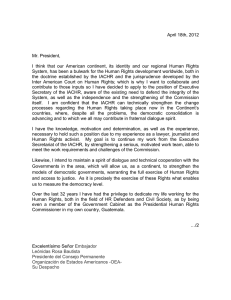
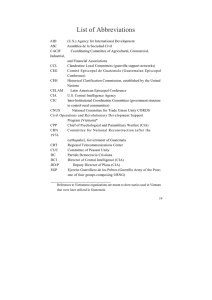

![FERROVIAS Guatemala [illegible] Guatemala City, September 16](http://s2.studylib.es/store/data/006239407_1-e2fc4da168ab6d0785009124ea28e0c9-300x300.png)
